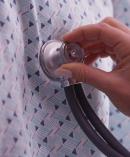It’s a scary feeling: In the middle of the night, you feel your heart flutter in a way that makes you wonder if something may be wrong. Most of the time these palpitations are harmless and occur in healthy people. When they occur repeatedly and with other symptoms, however, you should consult a doctor.
What Does A Heart Palpitation Feel Like?
A heart palpitation may feel like a flutter or a pounding heart. It may feel like your heart has skipped a beat or perhaps it’s had a few extra beats. You may even feel it in your neck or throat. While we may experience heart palpitations at any hour of the day, we are more likely to notice them at night while we’re laying down.
How Common – And How Serious – Are Heart Palpitations At Night?
While it can be a scary feeling, nighttime heart palpitations are actually quite common. They occur most frequently to side sleepers – especially people who sleep on their left sides – as sleeping on your side can create some pressure within your body. Usually, palpitations are harmless and are not something that should cause you to worry.
If you’re experiencing heart palpitations, however, it’s helpful to know more about what they are and what causes them in the rare chance that they point to a serious cause.
What Causes Heart Palpitations?
Heart palpitations can be due to many conditions, from the ordinary to the severe. Sometimes they happen after we exercise more than we usually do. They might even result from consuming things like coffee, caffeine, chocolate, alcohol or rich foods. Fatigue and insufficient sleep are other culprits.
Less commonly, heart palpitations at night can be a sign of something more significant, such as depression, anxiety, low blood pressure, hyperthyroidism (which is an overactive thyroid) or arrhythmia (which is an abnormal heart rate). Hormone changes are another cause, which is why palpitations are more likely to occur in people who are pregnant, menstruating or in menopause.
When Are Heart Palpitations An Emergency?
Sometimes, heart palpitations are signals that something serious is wrong in the body. Please call an ambulance or seek emergency care if any of these occur with heart palpitations:
- Chest pain or upper body pain
- Dizziness
- Profuse sweating
- Loss of consciousness
- Nausea
Some serious conditions that may cause heart palpitations include:
Atrial fibrillation
Sometimes, heart palpitations can be a sign of atrial fibrillation (commonly known as aFib), which causes the heart’s top chambers to beat irregularly. Although this is a fairly common condition, it increases the risk of stroke. When it’s diagnosed early, however, aFib has many effective treatment options, including medication or a pacemaker.
Ventricular tachycardia
Until aFib, ventricular tachycardia is a rare condition. It causes the bottom chambers of the heart to beat too quickly, which means that a person can grow dizzy and short of breath.
Heart failure
Heart failure occurs when the heart is not capable of pumping blood properly through the body. According to the American Heart Association, heart failure might have the following symptoms:
- Shortness of breath
- Persistent cough that produces mucus
- Fatigue
- Excess fluid that may lead to swelling
- Heart palpitations
- Nausea
Please know, however, that heart palpitations on their own are not a sign that someone has heart failure. If you or someone you know experiences persistent heart palpitations along with some of the other symptoms above, they should see a doctor to learn more.
When Should You See A Doctor For Heart Palpitations?
If you experience heart palpitations at night frequently and for longer than a few seconds, consider seeing a doctor to learn if they’re harmless or due to an underlying condition.
To prepare for your appointment with your doctor, try to keep a journal of your heart palpitations. Record when each episode occurs and how long it lasted. Along with that information, jot down other possible contributing factors, including your stress level that day and anything you ate or drank right before bedtime. This information will help your provider understand what may be causing your heart palpitations and can lead to a diagnosis.
If you’re worried about heart palpitations, visit the cardiac experts at AnMed Heart and Vascular Care. They use state-of-the-art diagnostic tools that show you the cause of your palpitations, and they’ll work with you to create a treatment plan, if necessary. Call to make an appointment at either the Anderson or Clemson location: 864.512.8671



